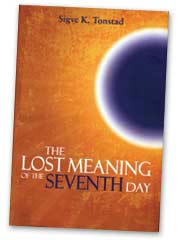The Lost Meaning of the Seventh Day
Sigve K. Tonstad, an associate professor of religion and an assistant professor of medicine at Loma Linda University, Andrews University Press, Berrien Springs, Michigan, 2009, 589 pages, US$29.99, hardcover. Reviewed by Peter M. van Bemmelen, a retired theology professor from Andrews University who has served the Seventh-day Adventist Church for 45 years as a pastor, missionary, and theology teacher in five different countries.
 he Lost Meaning of the Seventh Day, by Sigve Tonstad, is the most significant study of the seventh-day Sabbath published by a contemporary Adventist. Its main focus is on the meaning of the seventh day as the sign of God’s faithfulness as Creator and Redeemer of the human race and the world in which we live. Comprehensive in scope, it traces the history of this divinely blessed yet embattled and downtrodden institution through Old and New Testaments and the post-biblical era.
he Lost Meaning of the Seventh Day, by Sigve Tonstad, is the most significant study of the seventh-day Sabbath published by a contemporary Adventist. Its main focus is on the meaning of the seventh day as the sign of God’s faithfulness as Creator and Redeemer of the human race and the world in which we live. Comprehensive in scope, it traces the history of this divinely blessed yet embattled and downtrodden institution through Old and New Testaments and the post-biblical era.
 Tonstad states at the beginning, “The seventh day is an experience and not only history or theology” (p. ix). Undoubtedly these words reflect the author’s own religious experience as well as his wide-ranging scholarship. He brings to his work not only the academic skills of an accomplished theologian but also the compassionate and professional touch of a physician (he completed a Ph.D. in New Testament Studies and an M.D.). In addition, his mastery of the English language frequently makes for engaging reading.
Tonstad states at the beginning, “The seventh day is an experience and not only history or theology” (p. ix). Undoubtedly these words reflect the author’s own religious experience as well as his wide-ranging scholarship. He brings to his work not only the academic skills of an accomplished theologian but also the compassionate and professional touch of a physician (he completed a Ph.D. in New Testament Studies and an M.D.). In addition, his mastery of the English language frequently makes for engaging reading.
The content of the book is divided into four parts and 27 chapters. Part 1 consists of one chapter introducing the seventh day. It sets the stage for the rest of the book. While each chapter is worth reading by itself, only a sustained study of the entire book will make manifest the true meaning of the seventh-day Sabbath as the unchangeable gift and revelation of a loving and covenant-keeping God to humanity.
In the second part of the book Tonstad provides refreshing insights into the multifaceted meaning of the seventh day in the Old Testament. He concludes from its first mention in Genesis that “the seventh day tells of the importance of human beings to God, and its primary message is not human duty but divine commitment” (p. 38). Although human beings, deceived by Satan, came to distrust God’s goodness, the Creator remained faithful to His original purpose for them and for the world.
In part 3 Tonstad focuses on the Sabbath in the New Testament. He highlights the fact that all four Gospels “make the healing ministry of Jesus on the Sabbath a major emphasis and a subject fraught with far-reaching consequences” (p. 182). The historical part of the book—part 4—provides deep insights into the agelong war against the seventh-day Sabbath and its meanings.
The book is well documented and has excellent indexes, illuminating sidebars, and an extensive bibliography. Scholar, pastor, and theologically interested layperson alike can benefit from a serious study of this book.

 Tonstad states at the beginning, “The seventh day is an experience and not only history or theology” (p. ix). Undoubtedly these words reflect the author’s own religious experience as well as his wide-ranging scholarship. He brings to his work not only the academic skills of an accomplished theologian but also the compassionate and professional touch of a physician (he completed a Ph.D. in New Testament Studies and an M.D.). In addition, his mastery of the English language frequently makes for engaging reading.
Tonstad states at the beginning, “The seventh day is an experience and not only history or theology” (p. ix). Undoubtedly these words reflect the author’s own religious experience as well as his wide-ranging scholarship. He brings to his work not only the academic skills of an accomplished theologian but also the compassionate and professional touch of a physician (he completed a Ph.D. in New Testament Studies and an M.D.). In addition, his mastery of the English language frequently makes for engaging reading.